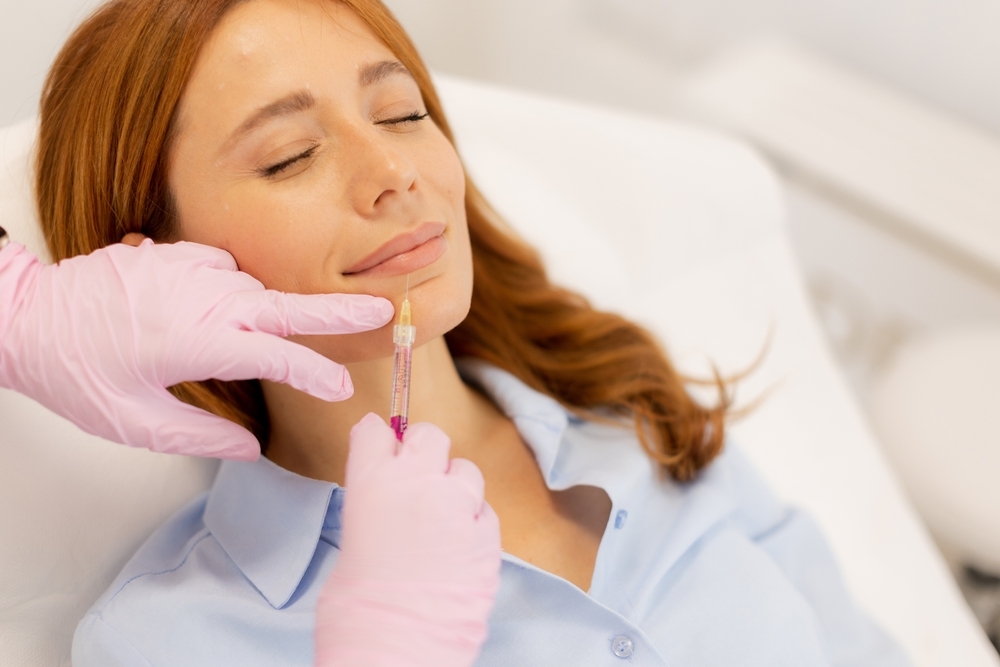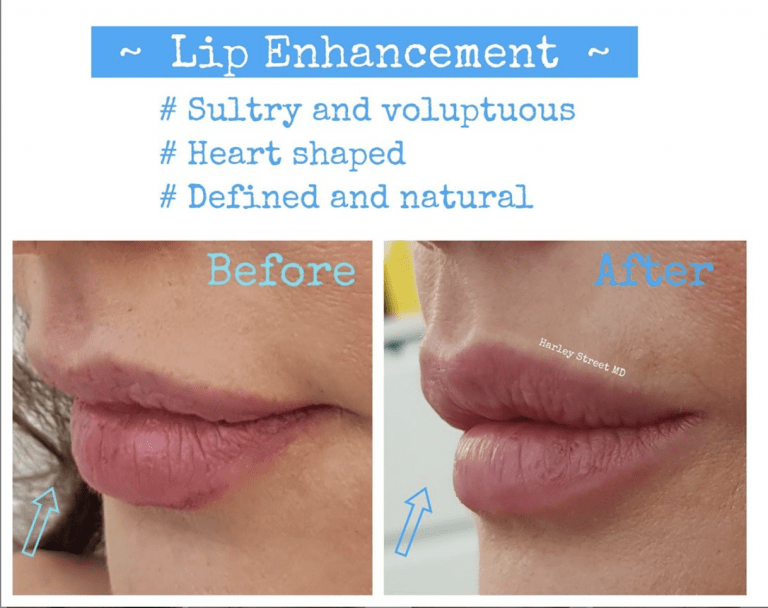
Lip enhancement is a fantastic way to improve the overall appearance of your lips and your face, whether you want a Kylie Jenner look or to fill them out for a subtle, fuller lip. However, if you’ve decided to get lip filler, it’s a good idea to do as much research as possible before your treatment.
Lip enhancement is one of the most popular non-surgical treatments in our London clinic. So, we’ve put together this list of what to know before having lip fillers.
Lip fillers are a type of dermal filler injected into the lips to add volume and shape. They can be used to correct several concerns, such as thin or asymmetrical lips, wrinkles around the mouth, and lost volume due to ageing.
According to the International Society of Aesthetic Plastic Surgery’s Global Survey, over 5.5 million hyaluronic acid filler procedures were administered in 2023, and lip filler is one of the most popular types of treatment.
Lip fillers have grown in popularity because they offer a quick, cost-effective and minimally invasive way to plump up the lips and achieve a voluptuous look. When administered by a qualified physician, lip filler can subtly enhance your appearance and boost your confidence.
Many people are unhappy with how their lips look, whether they feel they’re too thin or simply want a plumper pout. But are lip fillers the right choice for you?
Before getting lip fillers, it’s vital to consider the current shape of your lips and the change you hope to see. If you’re seeking a standout celebrity look, be aware this may not be possible for everyone, so go into the process willing to trust your practitioner’s advice.
You should also consider whether you want a temporary or permanent result and whether you’re happy to be injected with needles. If you’ve done your research, feel you understand what lip augmentation entails and are confident you want to go ahead, you’ll likely find lip fillers are a good fit for you. With some forward thinking, you can achieve the beautiful, fuller lips you’ve always wanted.
There are many types of dermal fillers on the market today, and your aesthetician will know which one is best for achieving your desired results. They may even use a combination of the best fillers for lasting results.
Hyaluronic acid is not a fake substance you need to worry about — it is a naturally occurring substance in our bodies. It is ideal for this procedure as it attracts water molecules and creates firmness in the skin. Our body’s natural HA decreases over time, so injecting HA into areas of the face can restore lost volume and provide a firm and smooth appearance. Our dermal fillers are pharmaceutical grade, and they are a safe and effective method of lip enhancement.
Some fillers are thicker and help create volume, which adds plumpness to the overall shape and can help patients with one lip that is thinner than the other. Other fillers help create a new shape in the lips — like if you need a more pronounced Cupid’s bow. You’ll discuss your desires at your first consultation so the injector will know which filler (or fillers) will be best for your needs. The brands Juvéderm and Restylane are the most commonly used dermal fillers.

Hyaluronic acid fillers are injected into the lips using a fine needle. This safe gel substance acts as a cushion under the skin, supporting tissues that may have lost volume or elasticity. As well as being hydrophilic, HA also boosts collagen production in the treatment area for desirable, natural-looking results.
An experienced practitioner will take the time to understand what you want from your lip filler treatment and provide expert advice to help you achieve a suitable look for your current lip shape and size. Lip fillers aren’t always about getting larger lips, and those who do want a celebrity pout may be advised against overdoing it at their first appointment, as this can significantly change their appearance.
When weighing up the pros and cons of lip filler, there are many points to consider, and we are often asked if lip enhancement is painful. Everyone’s pain tolerance is different, and you may feel a slight discomfort as the lip filler is injected and moved around the lips. However, the doctor will apply a numbing cream beforehand, and there is also local anaesthetic within the injection, so you shouldn’t feel too much discomfort before or after the procedure.
After the initial consultation — during which we at Harley St discuss the results you want to achieve — the entire lip filler procedure only takes a maximum of 45 minutes. You can get lip fillers on your lunch hour — the procedure is that quick! The results are immediate, and there is practically zero downtime. You may experience a little swelling or bruising in the days after the procedure, but you can go about your life as normal.
Lip filler results are temporary, with results depending on the type of filler used, the injection area, and individual metabolism. Most people can expect their enhanced lips to last between six months and a year before the filler naturally breaks down and is absorbed by the body.
Newer-generation fillers can last up to 18 months, but results vary — some people notice fading as early as four months, while others maintain volume for up to two years. To keep your lips looking their best, most people schedule touch-ups every six to twelve months.
It’s important to avoid overfilling, so a less-is-more approach is best. Visiting the clinic once or twice a year ensures a natural and balanced look. Always choose an experienced injector who understands facial harmony and precision to achieve the best results.

Yes, lip fillers are reversible. Hopefully, you won’t want your lip fillers reversed or removed, but knowing you can dissolve the filler if you don’t like the results is comforting.
Hyaluronic acid-based fillers will break down over several months, but if you’re unhappy with the results and would like the process reversed more quickly, a doctor can safely dissolve the filler with an enzyme called hyaluronidase. Substances like Botox cannot be dissolved, and we do not recommend using them for lips.
Dermal fillers are safe for use in all areas of the face and are EU and FDA-approved, so they are considered safe. Only safe lip filler options will be offered by reputable practitioners, so make sure you book with a board-certified professional.
Complications from dermal fillers are rare compared to surgery, but there are always risks associated with cosmetic procedures. You should only get dermal fillers from a board-certified professional or doctor to ensure your safety.
Before your treatment, you will be asked to sign consent forms to show you understand the procedure and any risks involved. These risks may include swelling, bruising, redness, bleeding (from the injection site) and possible scarring. About a week before lip enhancement treatment, it’s recommended not to take blood thinners or aspirin or drink alcohol. If you follow the pre-and post-treatment protocols, the risks are minimal.
After receiving injectable fillers, you may experience bruising or swelling, which usually subsides within a day or two. There is also a small risk of local infection, and if you are prone to cold sores, the injections could trigger one. If you are susceptible to cold sore flare-ups, an antiviral medication will be prescribed to minimise the risk of a breakout.
Within aesthetics, different levels of training involve various facial treatments and procedures. While it is not required by law to have any particular certification to administer dermal fillers, things like Botox require a prescription and a doctor to administer them.
Since regulations regarding fillers are lacking, we recommend looking at a practitioner’s education and certification, reviews, and any available before/after photos. If you can get a referral from a trusted friend — even better. Stick to a board-certified professional to reduce any risks.
In the UK, lip fillers can cost anything from £200 to £1500. The price of lip fillers will vary depending on the clinic you visit and how much filler you desire, but it’s always worth investing in treatment from an experienced practitioner you trust.
At Harley Street, MD, our lip enhancement procedure starts at £350, depending on the size and shape you prefer and the types of filler used. We encourage our clients to go for a natural look, and it’s better to start with less and work your way up. At your appointment, we may use half a syringe to begin. You then come back a week or so later if you decide you want to use the rest.







